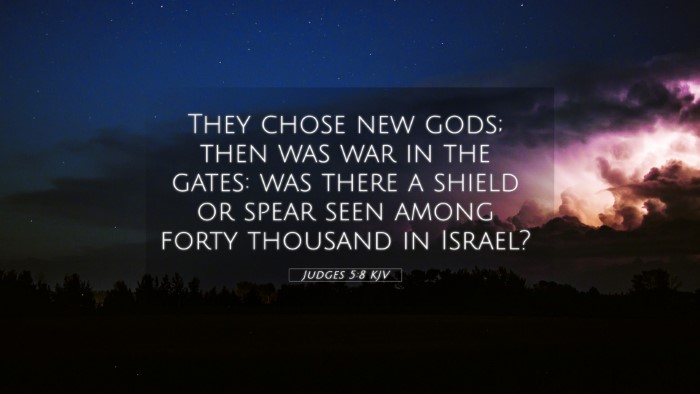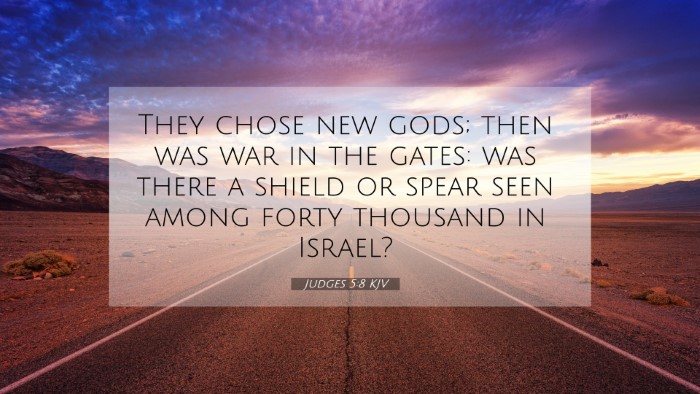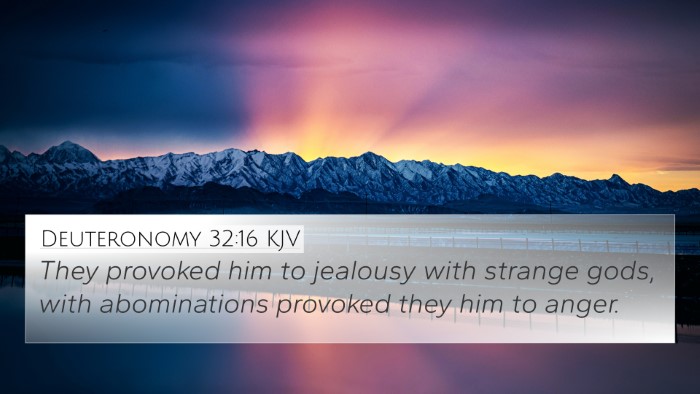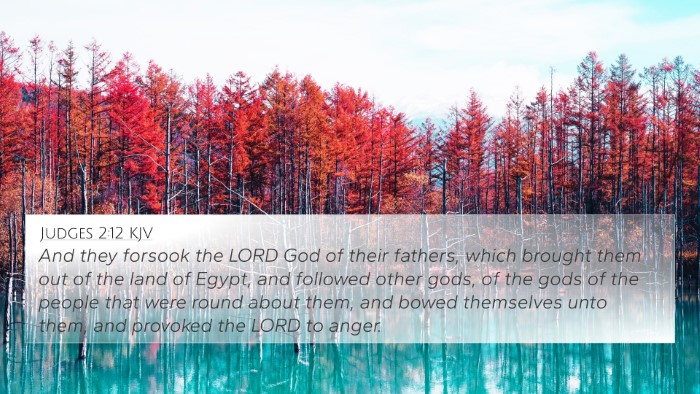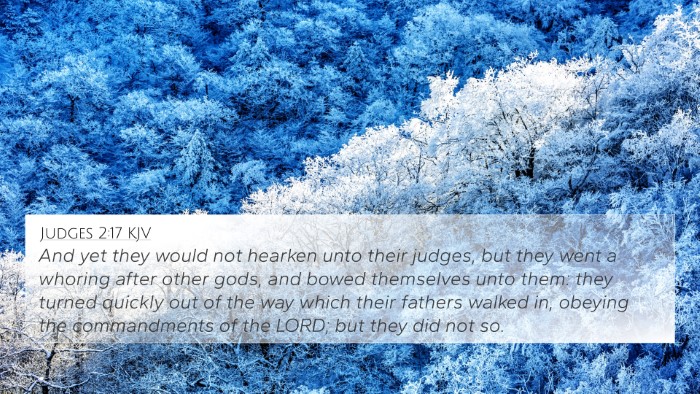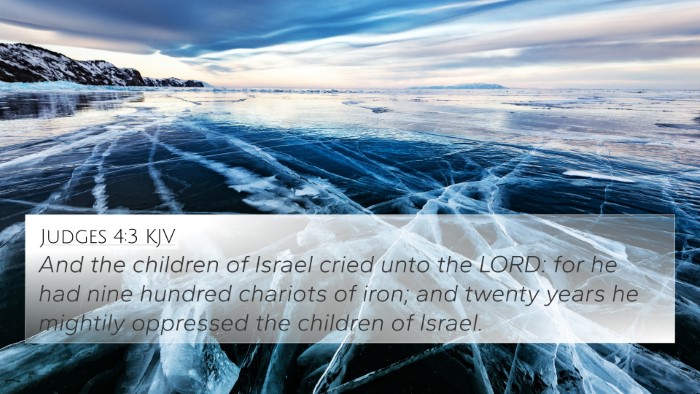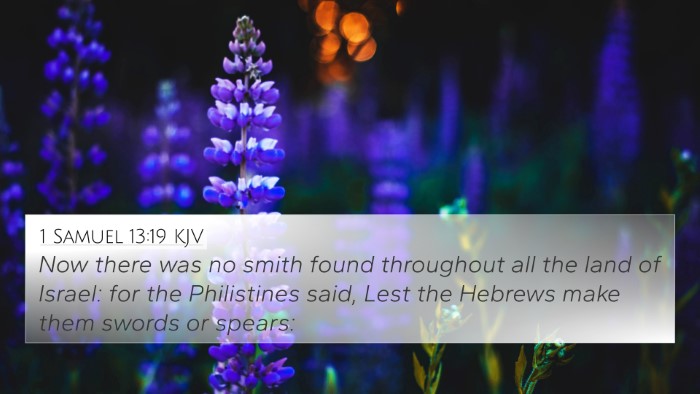Meaning and Interpretation of Judges 5:8
Judges 5:8 states: "They chose new gods; then was war in the gates: was there a shield or spear seen among forty thousand in Israel?" This verse encapsulates a theme of betrayal, conflict, and divine judgment in the history of Israel.
Contextual Overview
The Book of Judges is a narrative that portrays a cycle of the Israelites' disobedience, oppression, repentance, and deliverance. In the context of Judges 5, this passage is part of the Song of Deborah, celebrating the victory of Israel over their Canaanite oppressors led by Sisera. The song highlights God's role in Israel's military success and the moral failures of Israel's leaders and people.
Commentary Insights
-
Matthew Henry's Commentary:
Henry notes that the choice of "new gods" signifies Israel's turning away from the true God, leading to destructive consequences. He emphasizes that such unfaithfulness opens the door to conflict and chaos ("war in the gates"). The absence of weaponry among the Israelites indicates a time of vulnerability and the necessity of divine intervention to secure victory.
-
Albert Barnes' Notes:
Barnes elucidates the statement "They chose new gods," highlighting that this signifies a deliberate rejection of Yahweh for foreign deities. This choice resulted in their inability to defend themselves adequately, as illustrated by the mention of no shields or spears among the forty thousand men of Israel. Barnes connects this to the broader theme of covenant faithfulness and its consequences.
-
Adam Clarke's Commentary:
Clarke discusses the historical context surrounding this verse, interpreting "new gods" as a reflection of cultural assimilation and spiritual decline. He stresses that the people forsook their covenant and proper worship of God, leading to societal turmoil. The lack of weaponry symbolizes not only physical weakness but also spiritual disarray.
Thematic Connections
The themes in Judges 5:8 can be linked to other Biblical passages that resonate with the ideas of idolatry, divine judgement, and the need for reliance on God alone. Below are several cross-references that enrich the understanding of this verse:
- Exodus 20:3: "Thou shalt have no other gods before me." - A direct command against idolatry.
- Deuteronomy 32:16-17: "They provoked him to jealousy with strange gods." - Illustrates the consequences of choosing other deities.
- 1 Samuel 12:10: "And they cried unto the Lord, and said, We have sinned; for we have forsaken the Lord..." - A call to repentance after idolatry.
- Psalms 78:57: "But turned back, and dealt unfaithfully like their fathers." - Reflects the recurring theme of Israel's infidelity.
- Isaiah 59:2: "But your iniquities have separated between you and your God..." - Highlights the relationship between sin and divine absence.
- Jeremiah 2:11: "Hath a nation changed their gods, which are yet no gods?..." - A poignant reminder of the folly of idolatry.
- Hebrews 11:32-34: "And what shall I say more? For the time would fail me to tell of Gideon..." - Talks about faith figures who relied on God for victory.
Conclusion
Judges 5:8 serves as a sobering reminder of the spiritual recalls, reflecting on Israel's history of turning away from God and the inevitable conflict that arises from such decisions. The insights from various commentaries shed light on the deeper implications of the verse, urging readers to consider their own loyalty to divine truth and the importance of nurturing a faithful relationship with God.
Related Themes and Studies
This passage invites believers to explore the broader themes of covenant faithfulness, divine justice, and the consequences of spiritual disloyalty. Engaging with tools for Bible cross-referencing can enhance the understanding of Scriptural connections:
- Making use of a Bible concordance aids in identifying and studying related verses.
- Employing a Bible cross-reference guide can facilitate a deeper exploration of themes across scriptures.
- Utilizing cross-referencing Bible study methods allows for a cohesive understanding of the relationship between different biblical texts.
By delving into these connections, followers of the faith can gain greater insight into their spiritual journey and the lessons embedded within the Scripture.

